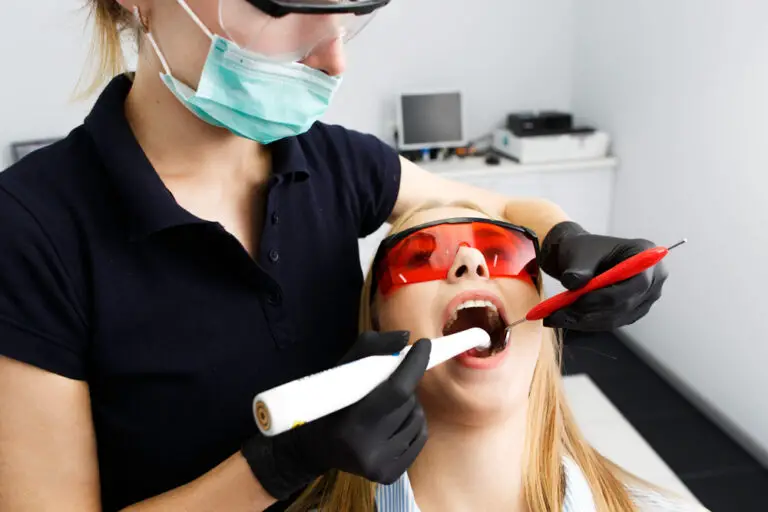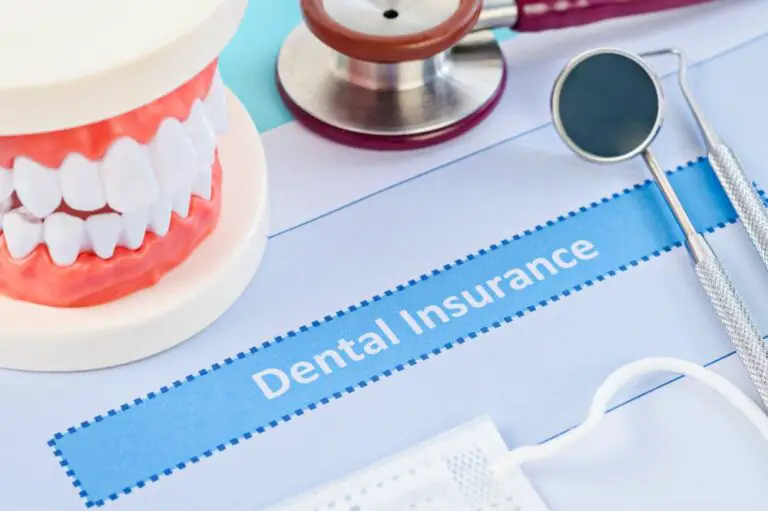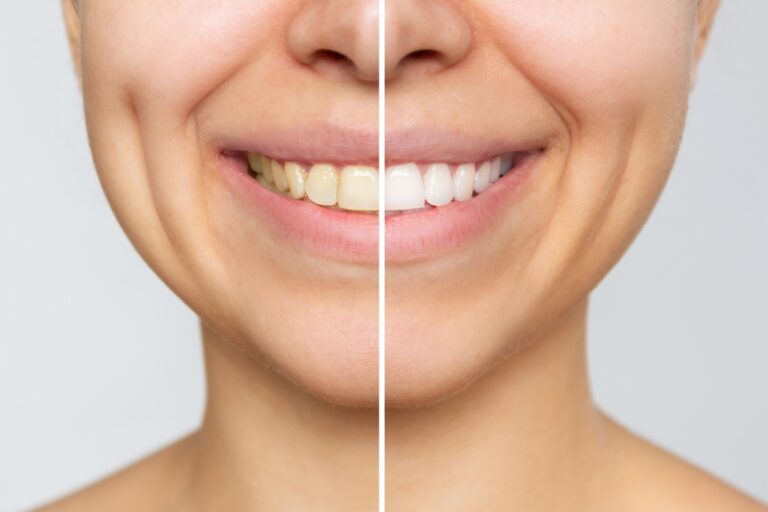Tooth pain, or toothache, is one of the most excruciating pains you can experience. Unlike headaches or muscle aches that may come and go, toothache pain is persistent, penetrating deep into the nerves of your teeth and jaw. It’s no wonder that a toothache can make it nearly impossible to fall asleep or stay asleep throughout the night.
Causes of toothaches
Toothaches can have different causes, including:
1. Cavities
Cavities are areas of decay on the enamel, dentin, or cementum of teeth. They occur when plaque, a sticky film containing bacteria, builds up on the teeth. The bacteria metabolize sugars and carbs to produce acids that erode the tooth structure. This erosion continues forming a hole or “cavity” in the tooth. The tooth decay reaches the inner pulp tissue, which contains nerves and blood vessels. This leads to inflammation and infection of the pulp, causing throbbing pain.
2. Cracked or broken teeth
Cracks or fractures in the teeth can allow irritants and bacteria to seep inside and inflame the inner pulp. Cracks are often caused by chewing hard foods, grinding teeth, or trauma injury. The pain can be sharp and sudden, especially when chewing or exposed to hot/cold foods.
3. Abscesses
A tooth abscess forms when there is a bacterial infection deep within the root canal system of a tooth. Abscesses cause a pocket of pus to form at the infection site, leading to intense pain. The bacteria and inflammation put pressure on the tooth’s nerves.
4. Damage to the pulp tissue inside the tooth
The pulp contains nerves and blood vessels to supply nutrients to the tooth. If the pulp becomes irritated or inflamed from decay, cracks, trauma, or chemical damage, it can elicit strong pain signals. The pain may linger even after the stimulus is gone.
5. Gum disease
Chronic gum disease damages the gums, ligaments, and bone supporting the teeth. This leads to increased tooth mobility and sensitivity to hot or cold foods. It exposes more of the tooth root surface, which has living pulp tissue inside. This tissue inflammation results in toothache pain.
Whatever the cause, the pain can range from mild throbbing to intense, shooting pain. It may be localized to a specific tooth or radiate to other areas of your jaw, ears, or head. Needless to say, toothache pain is not something you can easily ignore and sleep through.
The impacts of losing sleep to toothache
 Losing sleep to tooth pain night after night can take a major toll on your physical and mental health. Effects of losing sleep include:
Losing sleep to tooth pain night after night can take a major toll on your physical and mental health. Effects of losing sleep include:
- Fatigue and lack of energy – Being unable to sleep due to tooth pain leaves you exhausted and devoid of energy during the daytime. Even routine tasks become difficult with insufficient sleep.
- Difficulty concentrating – Sleep deprivation impairs attention, focus and concentration. You may struggle to stay productive at work or keep up with studies when constantly tired.
- Irritability and mood changes – Prolonged pain and sleep loss often cause increased agitation, frustration, and mood swings. Relationships with friends and family can suffer.
- Impaired immune system function – Lack of sleep is linked with reduced immune system function. This leaves you more prone to viral infections like colds and flu.
- Increased risk of illness and infection – Poor sleep correlates to higher susceptibility to health issues like heart disease, strokes, diabetes and obesity. Tooth infections may also worsen without proper rest.
- Impaired cognition and motor skills – Insufficient sleep degrades your mental sharpness, memory, and physical coordination. This can impact performance and increase risk of accidents or injuries.
- Depression and anxiety – The stress of constant pain combined with sleep deprivation often triggers or aggravates mental health problems like depression and anxiety disorders.
Lack of quality sleep disrupts your circadian rhythms. This can influence key hormones in your body like cortisol and melatonin, affecting your metabolism, appetite, and other systems. Chronic sleep deprivation is associated with higher risks of serious medical conditions like obesity, heart disease, high blood pressure, and diabetes.
The temptation to sleep off the pain
When you’re battling throbbing tooth pain through the night, getting even a couple hours of uninterrupted sleep can seem like a blessing. You may be tempted to knock yourself out with sleep aids or pain pills, hoping you can just “sleep off” the toothache. However, this offers only temporary relief and does not fix the underlying problem causing the tooth pain.
While sleep can help alleviate pain to some degree, it is not a cure for toothache. You need to get proper dental treatment to resolve the cause of the pain and prevent it from returning night after night. Sleeping pills or sedatives only provide brief respite by depressing the central nervous system. They don’t treat the actual issue with your tooth’s nerves and inner tissue.
Relying on heavy-duty painkillers to numb the pain so you can sleep is also not advisable in the long run. Pain medications like opiates have high risks of addiction and side effects. They again only temporarily mask the symptoms without addressing the real problem.
The most you may get from knocking yourself out with sleep aids or pain pills is a few hours of rest. The toothache will keep recurring and likely worsen without proper dental care. Don’t turn to medications alone to sleep off tooth pain – see your dentist to fix the underlying issue.
Treating toothache for lasting relief

Trying to sleep off tooth pain is not an effective solution. Here are some proper ways to get relief from a toothache:
See your dentist
The most important step is to get examined by your dentist. They will:
- Take X-rays to visualize the tooth roots and surrounding bone
- Tap on teeth to check for cracks or pulp damage
- Check for loose teeth, swollen gums, or signs of infection
- Test reaction to hot and cold stimuli applied to suspect teeth
After a thorough dental exam, your dentist will determine what is causing the tooth pain and recommend appropriate treatment. Treatment may involve:
- Cavity filling – Removing decayed material and replacing it with composite resin or amalgam fillings.
- Root canal – If the pulp is infected, the dentist will remove the pulp tissue and seal the inner canal. This preserves the tooth.
- Tooth extraction – Pulling the tooth if the pulp is severely inflamed or the tooth cannot be repaired.
- Treating abscesses – Draining pus via the tooth or through the gums, and prescribing antibiotics.
- Fixing cracked teeth – Applying crowns, caps or fillings to stabilize the cracked tooth.
- Treating gum disease – Deep cleaning, antibiotics, and instruction on improved oral hygiene.
Prompt dental treatment can stop the pain at its source and allow you to get restful sleep again. Don’t prolong the agony with home remedies. See your dentist right away for accurate diagnosis and the right solution for your tooth pain.
Use pain relief medication
Over-the-counter pain medications like acetaminophen, ibuprofen, or naproxen sodium can temporarily alleviate toothache pain before your dental appointment. Here’s how these medications work:
- Acetaminophen – Reduces pain signals to the brain but does not impact inflammation.
- Non-steroidal anti-inflammatory drugs (NSAIDs) like ibuprofen, naproxen, aspirin – Blocks production of inflammatory prostaglandins to relieve pain and swelling.
- Lidocaine topical gels – Creates local numbness by preventing sodium ion influx in nerve cells.
Follow dosage instructions carefully to avoid side effects or overdose. See your dentist promptly if the OTC pain medications are inadequate for relief. Don’t over-medicate when you need professional dental treatment.
Rinse with warm salt water
Gargling with warm salt water 2-3 times a day can help reduce inflammation and pain by:
- Drawing out fluid from inflamed tissues in the gums
- Clearing away food debris and bacteria around the tooth
- Causing osmotic movement of fluid to wash away irritants
Mix 1 teaspoon salt in a cup of warm water. Swish this around your mouth for 30 seconds and spit it out. Repeat with each use.
Apply cold compress
Applying an ice pack or cold compress to your cheek near the painful tooth can relieve pain and swelling for a short time. Cold causes vasoconstriction of blood vessels, slowing down inflammation and edema. It numbs nerve endings temporarily as well.
Apply ice for 10-15 minutes several times a day, with a cloth between the ice and your skin. This simply buys some time until you can receive dental treatment.
Avoid irritating foods
Certain foods and drinks like sugar, alcohol, citrus fruits, and coffee can aggravate tooth pain. Avoid them until you get dental treatment. Have soft foods like yogurt, applesauce, pudding and scrambled eggs that are gentler on painful teeth.
Hard, crunchy, hot, cold or acidic foods irritate exposed dentin and inflamed pulp tissue. Sugary foods feed the bacteria causing decay. Alcohol causes vasodilation which increases bleeding, swelling and pain.
Use dental pain relief gels
Gels containing benzocaine, lidocaine or similar numbing agents can provide temporary relief when applied directly on the gums next to the painful tooth. This works for mild pain.
These gels numb pain signals from the tooth’s nerve fibers so you don’t feel the pain for an hour or so. However, they don’t resolve the actual issue like infection or cracks. See your dentist to fix the underlying problem.
Take antibiotics for infections
If your toothache is caused by a bacterial infection in the tooth or gums, your dentist may prescribe antibiotics. Antibiotics like penicillin, clindamycin, cephalexin can fight infections and relieve pain.
The medicine kills the bacteria inside the tooth, clearing up abscesses and inflammation. Be sure to finish the full antibiotic course even if the pain subsides sooner. This prevents recurrence of infection.
In summary, while home remedies may provide small temporary relief, you need complete dental treatment tailored to your specific toothache cause for lasting relief and restful sleep. Don’t delay – see your dentist promptly.
How long can a toothache last if not treated?

Toothaches don’t just go away on their own. Without proper dental treatment, the pain can last for weeks, months, or even longer. The severity may fluctuate during this time, but it will keep recurring.
Leaving a toothache untreated allows the underlying problem to worsen. Here’s what happens over time:
- A small untreated cavity progresses into a larger cavity, eventually reaching the pulp tissue. This results in intense pain that keeps worsening.
- Infected pulp leads to abscess formation, bone loss, and severe inflammation spreading to other teeth. Excruciating pain may radiate through the jaw.
- Cracked teeth fracture further as they weaken from repeated chewing forces. Bacteria seep deeper through the cracks, causing deteriorating pulp and nerves.
- Gum disease advances further, allowing more bacterial toxins to accumulate beneath the gums. This breeds more inflammation and infection, destroying connective tissues and bone.
Without treatment, the tooth structure continues to break down, and bacteria destroy soft tissues surrounding the tooth. Seeking prompt dental care is crucial for stopping tooth pain fast and preventing complications like:
- Spreading infection to other teeth and facial spaces
- Formation of cysts, surgical removal becoming necessary
- Loss of tooth vitality requiring root canal treatment
- Eventual loss of the tooth altogether
This table summarizes how long toothache may persist with lack of treatment:
| Cause of Toothache | Duration of pain if untreated |
|---|---|
| Small cavity | Weeks to months |
| Large cavity | Months to over a year |
| Cracked tooth | Months to over a year |
| Abscess | Weeks to months |
| Pulp inflammation | Months |
| Gum disease | Months to years |
As you can see, a toothache is highly unlikely to go away on its own without the proper dental fix. Don’t wait it out. The sooner you get treatment, the sooner relief will come and let you sleep peacefully again. Letting the pain continue will only make the problem more complex to treat.
Sleep tips for fighting through toothache
Until you can see a dentist, you may have to endure some sleepless, painful nights because of a toothache. Here are some tips to help get as much rest as possible:
- Take OTC pain medication like ibuprofen or acetaminophen before bedtime to reduce pain at night. Set an alarm to take another dose during the night if needed. Don’t exceed daily dosage limits.
- Use numbing gels or rinses containing benzocaine on the gums by the painful tooth right before bed. This can numb pain receptors locally for a few hours. Reapply as needed.
- Sleep propped up on extra pillows to minimize throbbing. Elevating your head helps blood circulate away from the tooth. Use pillows to support your head, neck and back for comfort.
- Avoid eating or drinking anything for 2-3 hours before bed to prevent aggravating the tooth. Acidic, hot, cold or sugary foods can inflame the tooth shortly before bed making pain worse.
- Apply a cold compress like an ice pack wrapped in a cloth to your cheek near the painful tooth before bed. Use for 10-15 minutes to reduce inflammation. Reapply if you wake during the night with pain. Don’t use longer than 15 minutes to avoid frostbite.
- Listen to soothing music or white noise like a fan to distract from the pain at bedtime. Peaceful music can relax your mind. Background noise masks and drowns out throbbing sensations.
- Avoid caffeine close to bedtime as it can amplify pain. Caffeine is a stimulant that makes nerves more sensitive.
- Try relaxation techniques like deep breathing, meditation, or progressive muscle relaxation to reduce stress about the pain. Deep breathing also uses your diaphragm which increases blood flow from your tooth.
- Have pain relief supplies ready – Keep water, medications, numbing gel, ice packs etc. set up on the nightstand. That way you can easily manage pain flares throughout the night without having to get up and search for remedies.
Although these won’t cure the toothache, they may provide small measures of relief to grab some shut-eye as you plan urgent dental treatment. Don’t let the pain go on indefinitely. See your dentist right away for solutions to sleep easy again.
Frequently Asked Questions
1. Is it okay to take sleep medication when I have a toothache?
Taking over-the-counter or prescription sleep aids occasionally is generally fine for a short period, but they only mask the pain temporarily. Sleep medications like diphenhydramine (Benadryl), doxylamine succinate (Unisom), zolpidem (Ambien) work by depressing the central nervous system. This can reduce pain perception so you fall asleep more easily.
However, they do not treat the actual dental issue like damaged nerves or infected pulp causing the toothache. Relying on sleep aids alone allows the problem to worsen unchecked. It’s important to see a dentist for proper diagnosis and treatment of the tooth pain for lasting relief.
2. Can I wait a few days to see if my toothache goes away before seeing a dentist?
You should see a dentist for a toothache as soon as possible. Tooth pain usually indicates a significant problem like nerve inflammation, infection, cracks, or pulp damage that will only worsen without prompt treatment. Waiting days or weeks allows more decay and bacterial overgrowth to occur, making the problem more complicated to treat.
Getting early dental care can stop the infection before it infiltrates deeper into the tooth and surrounding tissues. It also increases the chances of saving the tooth with a filling or root canal rather than extraction. Don’t delay – seek dental attention immediately at the first sign of toothache for the best outcome.
3. If I ignore my toothache for too long, could I lose the tooth?
Yes, neglecting treatment for toothache raises the risk of eventual tooth loss. The underlying cause like untreated decay, cracked tooth, abscess or gum disease will rapidly worsen over time without care.
This ongoing damage can destroy the tooth structure beyond repair. The infection may spread extensively into the root and bone, making salvaging the tooth impossible. In such cases extraction is the only option.
It’s critical to get dental care immediately when you have persistent toothache before permanent harm is done. Early intervention with fillings, antibiotics, or root canal can often still save a painful tooth rather than pulling it. But delaying for too long could make tooth loss inevitable.







